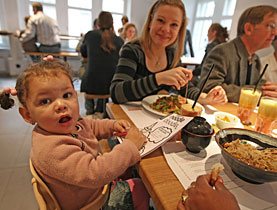“Spoilt brat” exploits new eating trend

A trendy Asian noodle chain from Britain is hoping to cash in on a growing demand for quality fast food in Switzerland by opening its first restaurant in Winterthur.
Wagamama, a Japanese word for wilful child, has enjoyed runaway success in several countries, and aims to expand its operations to several restaurants in Switzerland in the coming years.
The chain is loosely based on Japanese ramen noodle bars and targets young “cash rich, time poor” professionals with quick service and an informal setting. It believes its niche market is growing, yet still underdeveloped in Switzerland – and ripe for the picking.
“There is a similar trend for fast, casual food in Switzerland as there is in other markets that we are present in,” Wagamama director of international licensing, Andreas Karlsson, told swissinfo. “There are some good concepts here that are doing well.”
Such concepts include the growing vegetarian restaurant chain Tibits, partnered by the Hiltl group. The first Tibits opened in Zurich eight years ago and has expanded to Winterthur (opposite Wagamama), Bern and Basel with a London unit to open this year.
Supermarket chain Migros will open its first Asian noodle fast food restaurant Cha Cha in Bern this October, with others to follow in the coming years.
Other individual Asian-themed restaurants are springing up around Switzerland, but Wagamama has spotted room for a chain of such eateries. A Zurich restaurant will open in September with potential for others in Geneva, Basel, Bern, Lucerne and Lausanne.
Non-traditional
Karlsson hinted that Switzerland was chosen ahead of bigger markets, such as Germany, France and Italy, not only because it could beat its main competitors to the punch but also because a number of criteria fell into place at the right time.
One of those criteria was finding a suitable franchise partner, the catering group SV Schweiz, which has bought its first ever high street restaurant project.
Group business development director Dieter Koller believes Wagamama will bridge the gap between burger bars and the traditional, yet time consuming, three-course eating experience.
Long tables and benches replace small individual seating areas with diners sharing their mealtimes side-by-side with total strangers. And food is served up as soon as it is ready, with main courses and side dishes arriving at the same time.
“Some people may struggle with the concept at first as this is not the classical way of eating in Switzerland,” Koller told swissinfo. “But urban diners will become fans of eating nutritious food in a relaxed, non-complicated atmosphere.”
New taste
Diners will also have to adjust their palettes to the low salt style of cooking, judging from comments from test diners who have sampled the menu. But Koller is convinced it will appeal to those following the healthy eating trend.
Ramen is a dish of thick noodles served in a soup with vegetarian, seafood and meat varieties. It has its roots in China, but was exported to Japan where it was refined for the home market.
Although ramen is the stock dish on Wagamama menus, the chain has also brought in other Asian influences. And as a special favour to Swiss diners, only restaurants in Switzerland also include coffee in addition to the normal green tea.
swissinfo, Matthew Allen in Winterthur
The Wagamama Asian noodle chain opened its first branch in London in 1992.
The Japanese name has various translations in English, from “selfish” to “naughty child”. Founder Alan Yau was inspired by a selfish Japanese flat-mate he was sharing with at the time.
The chain opened its first restaurant outside Britain and Ireland in Amsterdam in 2000, and now has 82 units in 13 countries.
The group’s core target customers are people aged 16 to 34 years of age who frequently east out and spend under SFr30 per head on a meal. Wagamama has seen some 50,000,000 diners pass through its doors in the past 15 years.
The catering group SV Schweiz was formed in 1914 as a non-profit organisation to provide low cost, healthy food for Swiss army soldiers.
Four years later the organisation expanded into business catering and now provides a service for hotels, hospices, universities, stadiums and events.
The group expanded into Germany in 1992 and Austria six years later.
Wagamama is the group’s first venture into high street restaurant catering.

In compliance with the JTI standards
More: SWI swissinfo.ch certified by the Journalism Trust Initiative











You can find an overview of ongoing debates with our journalists here . Please join us!
If you want to start a conversation about a topic raised in this article or want to report factual errors, email us at english@swissinfo.ch.